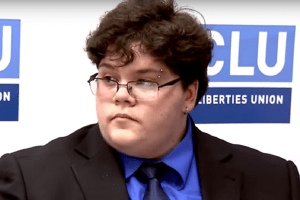Transgender Teen Can’t Use Boys’ Bathroom Right Now, Supreme Court Rules
A transgender teens landmark win over his school’s refusal to let him use the bathroom he associates with has been blocked by the U.S. Supreme Court, at least temporarily.
Gavin Grimm, a transgender student who associates as a male, attends a Gloucester County School in Virginia. The school originally accommodated Grimm, allowing him to use the boys’ bathroom. After complaints from other parents though, the school board later barred the school from making any accommodations.
They allowed Grimm to use a unisex bathroom, but that only caused Grimm further stress; he became so distraught about not being allowed to use the boys’ restroom that he began avoiding it all together at school, which ultimately led to health concerns for the young teen. He ultimately filed suit against the school alleging civil rights violations. 
In April earlier this year, a federal appeals court ruled in favor of Grimm declaring that schools must allow transgender students to use the bathrooms that match their gender identity. The decision was based on a regulation issued by the Department of Education, which declared that Title IX prohibits schools receiving federal funds from discriminating based on upon a student’s sex.
The school requested to stay the preliminary injunction requiring the school to accommodate Grimm as they prepared for an appeal to the U.S. Supreme Court. The high court granted the schools’ request, staying the decision. Grimm, in the meantime, will not be allowed to use the boys’ bathroom while the appeal is pending.
Is This Discrimination?
That’s obviously the hot topic issue right now. Title IX states:
“No person in the United States shall, on the basis of sex, be excluded from participation in, be denied the benefits of, or be subjected to discrimination under any education program or activity receiving Federal financial assistance.”
According to the U.S. Department of Education, this includes 16,500 local school districts, 7,000 postsecondary institutions, charter schools, for-profit schools, libraries, and museums. So, if you want their money, you need to comply with their rules.
Refusing to allow a child to go in the bathroom designated for the gender in which they associate is in itself discriminating based on sex. Forcing a transgender student to go into a separate designated bathroom is also a no go. The Supreme Court decided long ago in Plessy v. Ferguson “separate but equal is inherently unequal.” The school has privacy interests to protect, but it also has to protect the rights of transgender as well.
One major issue that seems impossible to overcome is the fact that if schools want to enforce the rule that you have to use the bathroom corresponding with the sex you were born with, someone has to be policing and actually enforcing these rules. Put another way, schools cannot practically check what a student’s gender is before letting them use the bathroom. What policies could the school possible put in place to monitor compliance with their rules that wouldn’t violate students’ privacy on another level? Under Title IX, the school cannot require a student to provide legal or medical evidence in order to have their gender respected.
So, What’s Next?
The school is in the process of appealing the decision to the Supreme Court. In the meantime, Grimm will be required, according to the school’s policy, to use the girls’ bathroom. If the Supreme Court refuses to hear the case, the 4th Circuit decision will stand. Because the 4th Circuit decision is a federal appeals court, the original decision is binding on all five states within the Fourth Circuit–Maryland, North and South Carolina, Virginia, and West Virginia.
California, Colorado, Connecticut, Massachusetts, New York, and Washington have all already enacted policies requiring schools to permit transgender students to use the bathrooms of the gender they associate with. Others are not so keen on the idea and a Supreme Court ruling on the matter could mean law changes.
While North Carolina has passed legislation requiring students to use the bathroom corresponding with the sex they were born with, whether the 4th Circuit decision is upheld will have a huge impact on that legislation and any other state wanting to ban transgender from using the bathroom they associate their identity with.
With such a controversy on the topic, just like they did with gay marriage and most recently workplace discrimination based upon sex, the Supreme Court will likely hear the case, if not now, than at some point in the near future.

Comments